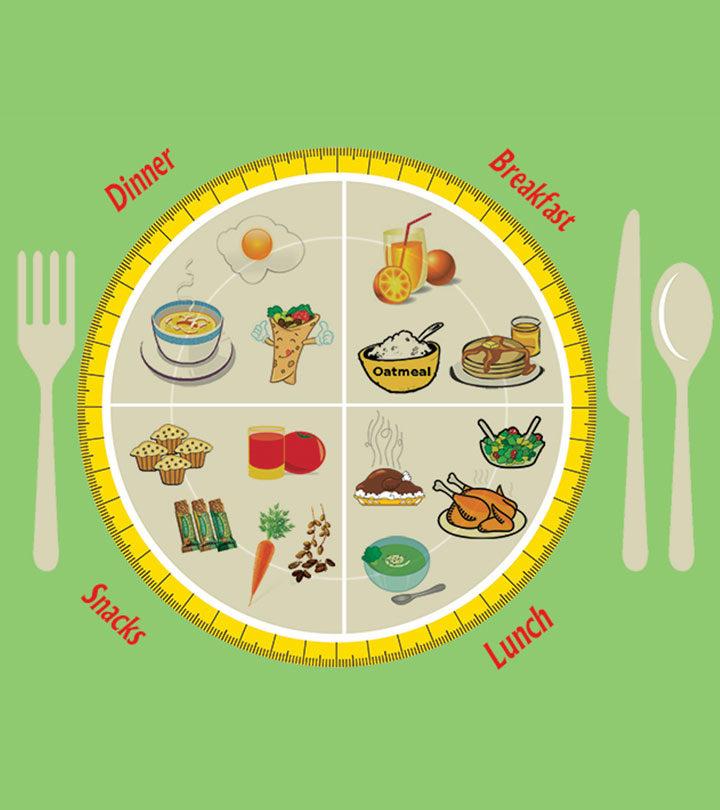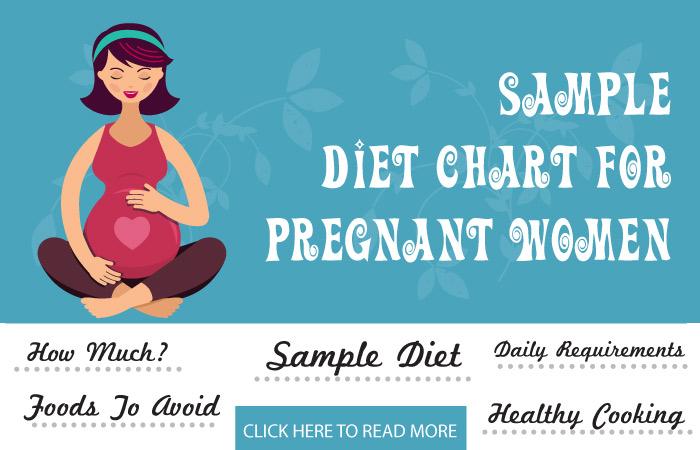Pregnancy Diet Plan Pakistan in Urdu

A pregnant woman with normal weight and body mass index (BMI) needs an additional 350Kcal a day in the second trimester and 500Kcal a day in the third trimester (1). These needs can be managed through a well-planned and nutritionally balanced pregnancy diet plan.
In this MomJunction post, we give you a sample pregnancy diet chart and general dietary guidelines.

Click here to view an enlarged version of this infographic.
Sample Diet Chart For Pregnant Women
Here is a sample menu for each meal that can be customized as per your preferences, trimester of pregnancy, medical concerns such as gestational diabetes, and general dietary habits.
However, consult your doctor and a certified nutritionist to prepare the plan.
SAMPLE MEAL PLAN FOR PREGNANT WOMEN
| Meal | Sample menu |
|---|---|
| Breakfast: It is the first and the most important meal of the day. So, never skip breakfast.This meal ought to be wholesome and nutritious in quality while being big in quantity. |
Or
|
| Midday snack: It fills up the gap between your breakfast and lunch that typically goes four to five hours apart in the case of working women. This snack should be rich in protein and dietary fiber to keep your hunger in control and maintain your blood sugar levels. |
Or
|
| Lunch: It is the second most important meal of the day. Skipping lunch can cause your sugar and energy levels to drop. |
Or
|
| Teatime: This snack helps battle your evening hunger pangs. |
Or
|
| Dinner: This is usually the last meal of the day and should be soothing and relaxing. Early and light dinners are an ideal choice during pregnancy since it can minimize the possibility of indigestion and acid reflux. |
Or
|
There are several nutritious foods to prepare healthy recipes. However, while you do so, consult your nutritionist or a registered dietitian so that you are aware of foods to avoid during pregnancy.
While you plan your meals, stay aware of the total servings that you would need per day from each food group. Here we tell you about the recommended servings for each food group for nutritionally wholesome meals (2).
- Fresh fruits and vegetables provide you with essential nutrients, dietary fiber, and vital bioactive compounds, such as antioxidants. Include a minimum of one serving each of dark vegetables and citrus fruits along with two servings of (dark) green leafy vegetables.
- Enriched grains, whole grain cereals, pseudocereals, and millets can be included in the diet. This food group provides energy, dietary fiber, and various essential micronutrients such as vitamin B-complex. Six servings a day can meet the energy needs of a normal weight pregnant woman.
- Milk and milk products are a good source of protein, vitamin D, and calcium with several other essential nutrients. Three servings of zero fat or low-fat milk or milk/dairy products a day are recommended for consumption on a regular basis.
- Meat, poultry, fish, and legumes provide high-quality lean protein. Two to three servings of this food group a day are sufficient. You may try extra-lean meats, de-skinned chicken, fish, dried beans, and peas. Oily fish is a good source of omega-3 fatty acids.
- Drink about 8-12 glasses of its fluid not water needs a day. Water is important for the absorption of nutrients and the removal of waste from the body.
Stick to basic dietary guidelines along with a diet plan for the maximum benefit.
General Dietary Guidelines During Pregnancy
Eating nutritious food is crucial for you and your growing fetus. Observe these basic steps (3) (4).
- Eat a well-balanced diet to ensure that you get optimum nutrition. To track your intake, maintain meal planners and food diaries in every trimester. Below is a list of some of the nutrients that you need for specific functions.
-
- Calcium: It can reduce your risk of preeclampsia (high blood pressure). For a growing fetus, calcium aids in the development of skeletal structure and teeth. Pregnant women are recommended to consume 1,000mg (milligrams) of calcium a day from various food sources.
-
- Folic acid or vitamin B9: It is essential for the development of the nervous system and is required to prevent certain birth defects, such as neural tube defects. During pregnancy, you need 600mcg per day from food. However, even with a well-balanced diet, the recommended amount is not absorbed from foods alone. Thus, you need to take a folic acid supplement.
-
- Iron: It is an important mineral for your baby's growth and brain development. During pregnancy, your blood volume gets doubled, so you need more iron. The daily recommended quantity is 27mg.
-
- Vitamin D: It helps in the absorption of calcium and certain other physiological functions, such as hormone production. Pregnant women should be getting 600IU (international units) of vitamin D per day.
- Stay active throughout pregnancy. Engage in regular exercise that is trimester-appropriate for healthy weight gain during pregnancy.
- Do not fast during pregnancy. It can disrupt levels of nutrients in the body and have adverse effects on the developing fetus.
- You can manage morning sickness during pregnancy by spreading meals into five to six small meals a day, including snacks. It will help you gain weight in a healthy manner. You should preferably eat something every 2.5 to 3 hours (5).
- Plan your meals with a variety of food groups. Eating meals rich in variety can help you attain maximum benefits from the food.
- Manage your food cravings during pregnancy by switching to healthier alternatives. Always discuss cravings with your nutritionist or a registered dietitian.
- Limit the intake of salty, high fat, high sugar foods, and processed foods. Excess consumption of these foods could lead to weight gain and might cause other health complications, as well.
- Stay hydrated by drinking water. Avoid beverages such as cola, coffee, and alcohol. Excessive intake of these beverages can have adverse effects on fetal development. These beverages are a rich source of empty calories and anti-nutrients that hinder nutrient absorption.
- Do not consume any dietary supplements such as daily prenatal vitamins, without medical guidance. Consuming an excess of prenatal vitamin supplements can be harmful. In some cases, it may lead to constipation, diarrhea, nausea, loss of appetite, upset stomach, and cramps.
Planned meals during pregnancy are good for your health and support rapid fetal development. Consume a diet that consists of a variety of food groups in the right quantity and serving. It helps manage pregnancy weight, helps in healthy fetal development, and will reduce pregnancy weight postpartum.
References:
MomJunction's articles are written after analyzing the research works of expert authors and institutions. Our references consist of resources established by authorities in their respective fields. You can learn more about the authenticity of the information we present in our editorial policy.
The following two tabs change content below.
- Reviewer
- Author

Jyoti Benjamin has 25 years of experience as a clinical dietitian and currently works in Seattle. She focuses on teaching people the value of good nutrition and helping them lead healthy lives by natural means. Benjamin has a masters in Foods and Nutrition, and has been a longtime member and Fellow of AND (Academy of Nutrition and Dietetics) and the... more

Swati Patwal is a clinical nutritionist and toddler mom with over eight years of experience in diverse fields of nutrition. She started her career as a CSR project coordinator for a healthy eating and active lifestyle project catering to school children. Then she worked as a nutrition faculty and clinical nutrition coach in different organizations. Her interest in scientific writing... more
Pregnancy Diet Plan Pakistan in Urdu
Source: https://www.momjunction.com/articles/sample-diet-chart-pregnant-women_0076927/